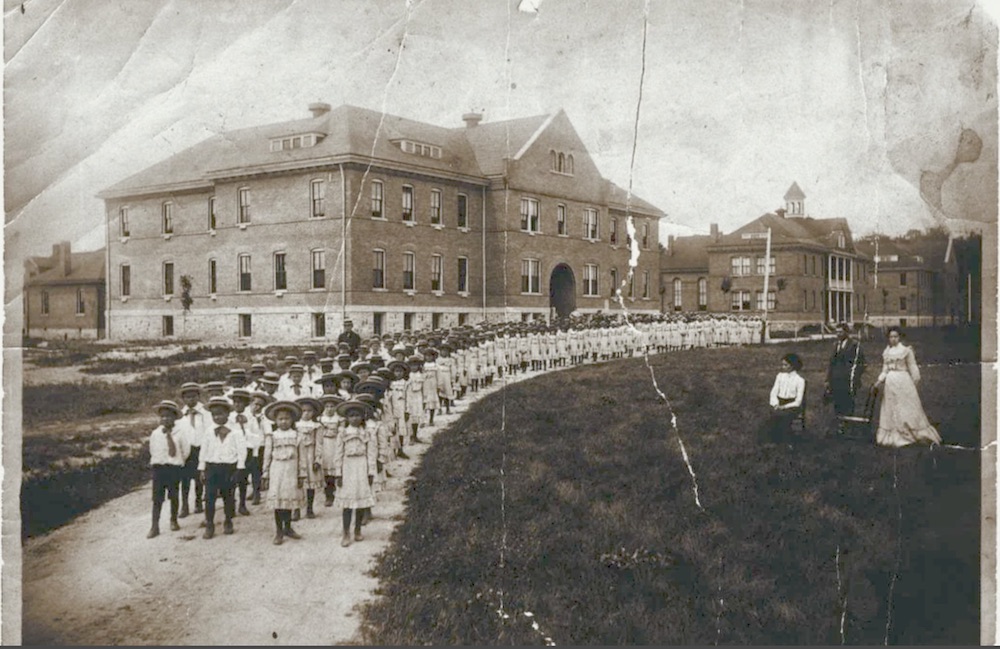
- Details
- By Native News Online Staff
The National Endowment for the Humanities (NEH) last week announced a $30,000 funding opportunity available to tribal nations, nonprofits, and states working with tribal communities for projects “that expand the reach and impact of the federal Indian boarding school initiative,” according to an agency press release.
The funds will support projects aimed at cultural and language revitalization, community conversations on the impact of federal Indian boarding schools, research related to unmarked graves and burial sites associated with the intuitions, repatriation efforts, oral history projects, and the creation of educational materials on the history of federal Indian boarding schools.
Any non-tribal entity that applies for funding must be in consultation with a federally recognized tribe, Chair of the National Endowment for the Humanities, Shelly Lowe (Diné) told Native News Online.
She added that non-tribal grantees will be required to follow NEH’s Code of Ethics Related to Native Americans, including safeguarding “the rights, expressed interests and sensitivities of those originating the material,” where documents or objects are researched.
The announcement marks an expansion of a previously established, inter-agency partnership. In April, NEH committed $4 million to support the digitization of records and collection of oral histories from the more than 400 Indian boarding schools the United States operated or supported from the mid-1800s through the 60s.
In May 2021, the U.S. Department of the Interior released Volume 1 of its Federal Indian Boarding School Initiative Investigative Report detailing the history and ongoing legacy of the federal government’s 150-year policy of forcibly assimilating Native American children into white culture by sending them to Indian boarding schools.
The same month, Secretary of the Interior Deb Haaland (Laguna Pueblo) announced a year-long “Road to Healing” tour across the country to provide Native survivors of the federal Indian boarding school system and their descendants an opportunity to share their experiences.
Lowe told Native News Online that this NEH funding is meant to complement the Road the Healing tour by supporting the community-specific healing needs afterward.
“One of the questions that communities ask all the time is: ‘What happens after this?’” Lowe said of the Road to Healing tour. “It is my intent to ensure that when we are in communities listening to this [boarding school history], that we don’t then walk away and not have something to support the communities with afterward. These special chairs grants are meant to help communities continue to think about history, to think about what the needs are in their own communities, and to create contexts that will help them continue to move forward.”
NEH will accept grant requests on a rolling basis until December 1, 2023. Drafts can be submitted to [email protected]. For questions on how to apply, visit the NEH website.
More Stories Like This
50 Years of Self-Determination: How a Landmark Act Empowered Tribal Sovereignty and Transformed Federal-Tribal RelationsNavajo Nation Considers Ending Statute of Limitations for Child Sex Offenses
Pokagon Band allowed into Michigan Adult-use Cannabis Market Through State Agreement
Prairie Band Potawatomi Native Divests Its ICE Contract
Breaking: Lumbee Tribe Set for Federal Recognition Under NDAA Passed by Senate
Help us defend tribal sovereignty.
At Native News Online, our mission is rooted in telling the stories that strengthen sovereignty and uplift Indigenous voices — not just at year’s end, but every single day.
Because of your generosity last year, we were able to keep our reporters on the ground in tribal communities, at national gatherings and in the halls of Congress — covering the issues that matter most to Indian Country: sovereignty, culture, education, health and economic opportunity.
That support sustained us through a tough year in 2025. Now, as we look to the year ahead, we need your help right now to ensure warrior journalism remains strong — reporting that defends tribal sovereignty, amplifies Native truth, and holds power accountable.
 The stakes couldn't be higher. Your support keeps Native voices heard, Native stories told and Native sovereignty defended.
The stakes couldn't be higher. Your support keeps Native voices heard, Native stories told and Native sovereignty defended.
Stand with Warrior Journalism today.
Levi Rickert (Potawatomi), Editor & Publisher


